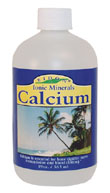Calcium,
the most plentiful mineral found in the human body ideally comprises
1.5 to 2% of an adult's total body weight. Every cell and organ
in the body depends on calcium for proper functioning. Teeth and
bones contain the majority of the body's calcium (about 99%). Calcium's
primary function is in the development and maintenance of healthy
bones and teeth. Of equal importance though is calcium's role in
digestion, blood clotting, wound healing, nerve signal transmission
digestion and our acid/alkaline balance. We, as a society -- especially
women over the age of 45 -- are routinely told by their doctors,
and the media, to supplement with 1000-1500 mgs of calcium daily
to prevent Osteoporosis. As with most tissues, bones are constantly
being reformed — broken down and rebuilt. Osteoporosis (porous,
brittle bones) is the result of bone deterioration over time (more
mineral resorption than absorption). Women are led to believe that
they are particularly prone to calcium deficiency and osteoporosis.
This is due to their presumed higher levels of estrogen which apparently
restricts calcium absorption. The end result of osteoporosis can
be spontaneous skeletal fractures. However getting enough calcium
won't guarantee a lifetime of healthy bones. Skeletal strength depends
on many minerals, especially silica, but also including phosphorus,
magnesium, boron, strontium and an adequate creation of vitamin
D. In fact, in the first volume of "Silica — the Forgotten
Nutrient," Klaus Kaufmann challenges the sole use of calcium
supplementation by adults and shows its interdependency with silica.

Symptoms of Deficiency:
Calcium
deficiency is a condition in which calcium is insufficient or is
not utilized properly. Poor calcium absorption into bone is a contributing
factor in osteoporosis, and because silica is known to help the
body utilize calcium, Kaufmann believes that supplementation of
both together is essential to prevent osteoporosis (Kaufmann,1992;
Saltman, Gurin, and Mothner, 1993).
Calcium
deficiency symptoms include muscle aches and pains, muscle twitching
and spasm, muscle cramps and reduced bone density. Vitamin D is
essential for proper calcium absorption and utilization.
Most
people measure high in calcium when a hair test is performed, yet
America has the highest levels of osteoporosis and arthritis in
the world. This is not from a lack of dietary calcium, but is a
calcium management issue. When evaluating the amount of calcium
in our supplement, measured in milligrams, it seems that it contains
very little calcium. Keep in mind that the amount of absorbable
calcium available in a traditional tablet or capsule is highly questionable.
However, you will be absorbing every atom of calcium in Eidon's
Calcium.


